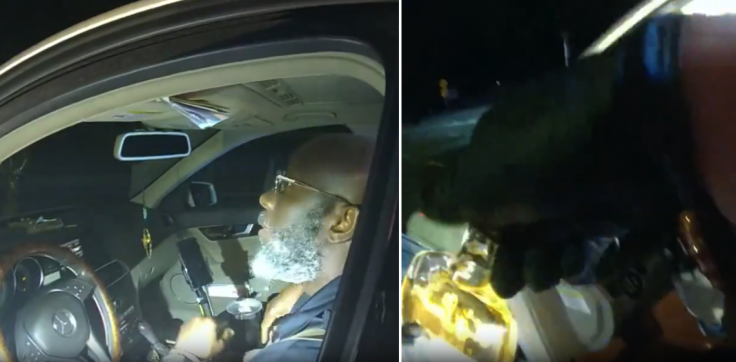
Last May, 56-year-old Calvin Riley was pulled over by police officers during a routine traffic stop in Tallahassee, Florida, and arrested for driving under the influence.
Now, bodycam footage has surfaced appearing to show one of the officers "planting" evidence in the man's white Mercedes Benz, leading to charges that Mr. Riley says has ruined his life.
Officer Initially Accused Riley of Smoking Marijuana DEspite Admitting Her Sense of Smell was Diminished
Despite initially suspecting marijuana use, the officers later suggested Riley smelled of alcohol. A search of Riley's vehicle supposedly uncovered an open liquor bottle, leading to his arrest for DUI and driving with a suspended license—despite Riley's assertion that the cup in his car contained Arizona Green Tea, not alcohol, as reported by local outlet Our Tallahassee.
Officer Kiersten Oliver, a 26-year-old recruit of the Tallahassee Police Department who initiated the traffic stop, claimed to have detected signs of impairment.
Oliver, in comments captured by her body-worn camera, tells Riley that he smells like marijuana. Riley, who says he doesn't smoke weed, accuses the officer of lying. At various moments in the forty-four-minute-long body camera footage, Officer Oliver seems to go from charge to charge, looking for a way to arrest Riley.
But, Office Oliver also admitted that her sense of smell was diminished at the time, telling fellow officer, Margaret Mueth, "I feel like I'm getting some indications, I'm not really sure. I can't really smell anything right now."
Bodycam Footage Appears to Show Officer Unsealing Liquor Bottle, Pouring Some of its Contents and 'Planting' it Back in Vehicle
The footage then records a conversation between Oliver and Mueth. Mueth testified that they formulated a plan: ask Riley to submit to a voluntary field sobriety test, and if he refused, they would exercise their voluntary discretion to arrest him. Riley refused to take the sobriety test and officers failed to inform him of the consequences.
Despite initial claims that Riley smelt like marijuana, by the time they had placed Riley in the back of Oliver's patrol car, officers began to claim that Riley smelled like alcohol. "Oh, there's vodka in his seat... vodka was found," Officer Oliver notes to her body-worn camera. While they search Riley's car, Officer Mueth's body camera shows Oliver holding up the full bottle of cognac. Oliver also points to an insulated stainless steel tumbler-style cup in the center console, which Oliver claims "smelled like alcohol."
Body-worn camera footage doesn't show the officers smelling the cup, or removing it from the center console. Riley says the cup contained Arizona Green Tea, which he says is his drink of choice. Body-worn camera footage shows additional Arizona Green Tea bottles in his backseat.
However, as Riley sat in the patrol car, Officer Oliver's camera appears to capture him unsealing the bottle of alcohol, pouring out its contents and then tossing it onto the floorboard of the passenger side of Riley's vehicle. The liquor bottle was a critical factor in the DUI charge.
Several Policy Violations Found During Riley's Arrest
This action, along with the decision to switch Riley to another patrol car, raises serious concerns about the officers' motives and adherence to protocol. As the case against Riley progressed, it became mired in procedural and ethical questions. During a pretrial hearing, it was revealed that no TPD policy prohibits impounding liquids as evidence, contrary to Officer Oliver's claims. Moreover, the judge acknowledged that Riley was not correctly Mirandized, leading to a ruling that excluded some body camera evidence from the trial.
The handling of Riley's arrest has sparked debate over police practices and the preservation of evidence. With his trial set to begin on April 5, the community and legal observers closely watch how these issues will be addressed in court.









